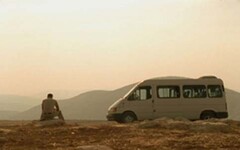The Electronic Intifada 30 September 2003
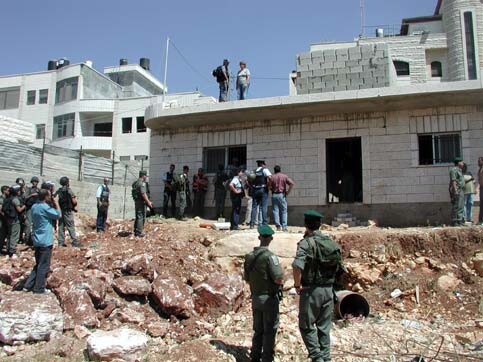
A new house in Beit Hanina, still under construction, moments before its demolition by Israeli bulldozers.
18 August 2003 — It’s been a bad day today. Our taxi driver, Rajai, was arrested briefly early this morning. Then the Americans murdered a Palestinian cameraman in Baghdad (Reuters photographer Mazen Dana) who is much respected around here. And then we witnessed a house demolition and saw raw cruelty up close.
The day began with Rajai’s detention at a checkpoint. At 6:00 a.m., he was driving a woman from his village outside Jerusalem — the village is al-Azariya, known to most of us as Bethany — for surgery scheduled for 8:30 at an Israeli hospital in West Jerusalem. Although Rajai has a Jerusalem ID card that allows him to be in the city, the woman, like most Palestinians, had neither a Jerusalem ID nor a permit to be in Jerusalem. So, despite having admission papers to an Israeli hospital, she was detained at a checkpoint into Jerusalem, as was Rajai himself for driving her. Rajai is no dummy and has made sure that he has an Israeli lawyer, so he called the lawyer, who arrived quickly to negotiate Rajai’s release at 7:45. By the time Rajai picked us up at 8:00, half an hour later than we had expected him, the woman had been released, but at that point Rajai did not know whether she had been able to get to the hospital for her surgery. He later went to the hospital to make sure she was there and discovered that she had made it safely by skirting the next checkpoint. The standard punishment for Rajai’s “offense” is either a fine of 5000 shekels (about $1100) or confiscation of the taxi for three months — no due process, of course. His lawyer recommended paying the fine and getting everything over with, so after Rajai was released, the lawyer negotiated the fine down to 3000 shekels (about $675) and paid it. Then the woman’s husband (who was unable to accompany her to the hospital because he didn’t have the right ID or a permit either) offered to help Rajai by paying 1000 shekels of the fine.
All in all, this was a minor incident. Rajai “only” lost two hours of his work day; many Palestinians wait for hours at checkpoints every day or are arrested for longer periods. The woman “only” lost probably several years off her life from worry; many Palestinians give birth at checkpoints or die there because Israeli soldiers won’t let them through, or simply die at home because they never even try to get through Israeli blockades. Rajai “only” owes $450, at a time when his business is so bad that he’s already talking about having to get another job because there is just not enough demand for taxis; many Palestinians don’t have jobs at all, or Israeli lawyers, and end up paying the entire 5000-shekel fine or having their cars impounded. And all of this occurs just enough under the radar screen, so that George Bush and his friends, and most of the Israeli-supporting American public, know absolutely nothing about any of it and don’t care much in any case.
The day got much worse. When we arrived at our work camp, Jeff Halper, who runs ICAHD (the Israeli Committee Against House Demolitions), received word that a house in the Jerusalem suburb of Shuafat was in the process of being demolished. He suggested that several of us go there as witnesses — not to stage a protest or be arrested, but just to see, and to let the Israelis know that someone saw. By the time we arrived, the house had already been destroyed, and we couldn’t get near enough, thanks to an Israeli military cordon, to see anything but the bulldozers leaving along a distant street. ICAHD has been keeping watch on a number of Palestinian houses in the neighboring town of Beit Hanina that have received demolition orders, so we decided to go there to visit the families.
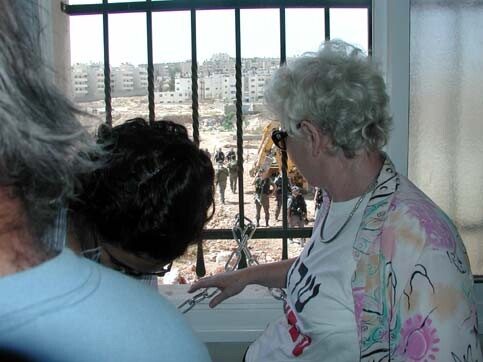
Two Israeli peace activists chain themselves to the house as Israeli soldiers and police stand outside and a bulldozer waits.
We arrived with the first police jeeps. Although we had not known the bulldozers were actually on the way, others had, and we arrived to find two Israeli women chained to the grillwork on a front window. One of the women, Sylvia, was from Peace Now and, along with a group of other Peace Now people, had done a hard day’s work with us at our work site last Friday. We had noticed her particularly because she wore a skirt and open-toed sandals, but worked just as hard as anyone in more appropriate work clothes. She had a skirt on again today.
The house was a small one, just one story, which dwarfed it a bit next to larger neighboring houses (which are also waiting out demolition orders). The house wasn’t quite finished and looked as though the family had not yet moved in, but it was clearly near completion. Lovely stone work and window grills decorated the front, and inside the floor was done in beautiful floral-design tiles. Small things stick in your mind at hard times like this, and it’s hard to get those tiles out of our minds.
Our whole group, about 12 or 13 of us, went inside the house, and only moments later a contingent of perhaps as many as 100 Israeli police and soldiers trooped up on foot, along with a group of demolition workers neatly decked out in bright red hard hats and dark blue t-shirts, looking incongruously like some costumed team at Disneyland. Two menacing bulldozers (Caterpillar brand: American-made, like all the other instruments of destruction in Israel’s arsenal) pulled up behind them and parked in the small front yard.
At this point, Jeff Halper decided to stay inside the house and let himself be arrested, but he urged the rest of us to leave. From past such actions, he was certain that we would not be arrested if we left the house peaceably. The owner had locked and barred the front door, so everyone, including several other internationals who were inside when we arrived, headed for the back door. Several got out, but Israeli soldiers quickly massed in the back, and the owner locked the door with a key before we two and about three others could get out. Since we have volunteered to be arrested at our own work camp if the Israelis ever come, we resigned ourselves to being arrested here, but a moment later the owner urged us to go up on the roof and get out by climbing down a ladder. He also talked Sylvia and the other Israeli woman into unchaining themselves. With some difficulty, we scrambled up a rather precarious ramp to the roof and looked over the edge to find a rickety ladder and a bevy of Israeli soldiers looking up. We made it down all right but slowly; you can do anything when you have to.
We tied up again with the rest of our group outside in the front, and we all hung around while the Disney team carried the owner’s furniture and belongings outside. This is a weird little touch — a bit of fastidiousness designed, apparently, to demonstrate that Israelis do have hearts after all and would not think of destroying the contents of someone’s home. Before the house was totally emptied, the Israelis began to move us back gradually, first behind the bulldozers; then around the corner where we couldn’t see the house very well; then, when we found a bit of high ground that gave us a good view, farther away still; then finally off the street altogether. We all finally found a good vantage point a block or so away where we could see well from a high spot.
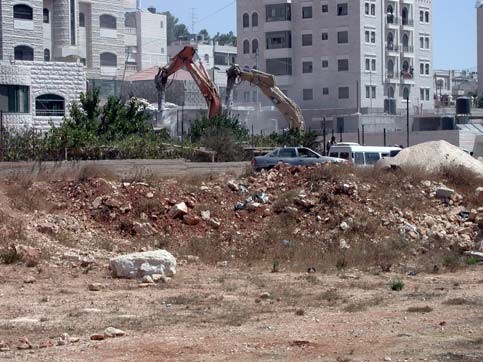
The roof caves in as two bulldozers with pneumatic drills destroy the house.
While we watched helplessly, the two Caterpillars, with pneumatic drills on their long dinosaur arms, systematically punched holes in the front of the house, then in the roof. Billows of dust began to rise as pieces fell off the house, then more as the roof began to fall in. The water tank on the roof was first dented, then punctured, sending out a large spray of water that was visible even from our distant perch. It all took only a few minutes. In fact, only an hour passed between the arrival and the departure of the Caterpillars, probably only 20 minutes from start to finish of the actual demolition. As the bulldozers left, we all walked back to the house. One of our work camp members, a young American Jewish woman who is about to be a senior at Middlebury College in Vermont and has spent the last year in Israel, had talked to a group of two or three Israeli soldiers throughout the demolition. When we arrived back at the house, one of us put a hand on her shoulder and said, “You weren’t able to talk them out of it,” and when she turned toward us, she was crying.
We all stood there crying, standing in front of the pile of rubble that had been a house only minutes before. For a few instants it was quiet, everyone speechless. Then a man began to cry aloud. Neighbors gathered around the owner, comforting him, but the heartrending sound of his sobbing continued. After a few moments, they urged him to get up, and he and several neighbors began building a canopied shelter in the front yard, using timbers from the house.
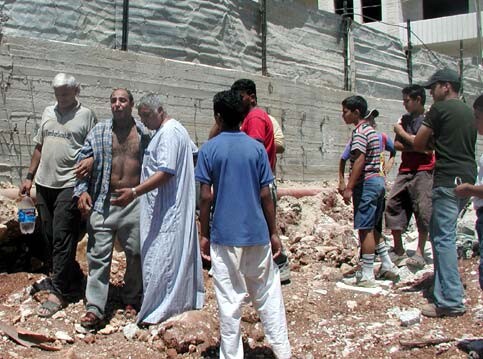
After the house is destroyed, the owner sobs and is comforted by neighbors.
This was an act of breathtaking cruelty, made even crueler by the fact that acts like this have become so very frequent that they are almost mundane — so mundane that our Palestinian friends have no particular sympathy for our emotion. “We live with this all the time,” one Palestinian at the hotel said when we told him what we had witnessed. And they do, of course. By ICAHD’s estimate, Israel has demolished 10,500 homes in the 36 years of the occupation, most often for the lack of a building permit (which, in a crazy catch-22, Israel makes impossible to obtain), frequently in order to clear land for “security” purposes. When the Road Map was initiated in May, Israel began a massive upsurge in demolitions. The Road Map specifically prohibits this but, with U.S. endorsement, Israel has found a loophole. The Israelis argue legalistically that whereas the Road Map prohibits demolitions for punitive reasons, it does not prohibit this destruction for zoning reasons. Political nitpicking with the U.S. seal of approval.
Most people have ways to work out their pain and anger. It helps to be able to write, or to talk it out with friends, or to become activists, or to do therapy. Many who have no other outlet and no hope of ever getting themselves out from under the thumb of this cruel occupation commit terrorism. We saw more clearly today the desperate logic of this helpless response.
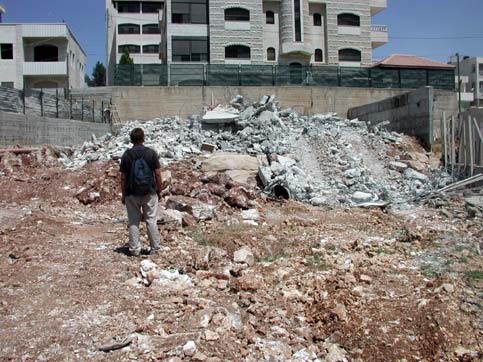
All that is left of the house.
Incidentally, Jeff Halper was released within a couple of hours of his arrest. As an Israeli citizen, he’s not in much danger of being detained for any length of time, unlike non-citizens and Palestinians. He’s done this many times and is a real hero.
Kathy and Bill Christison are both retired CIA political analysts. Kathy has been a freelance writer since resigning from the CIA in 1979, dealing primarily with the Palestinian-Israeli conflict. Her book Perceptions of Palestine: Their Influence on U.S. Middle East Policy was published in 2001. A second book, The Wound of Dispossession: Telling the Palestinian Story, was published in 2002. Bill served on the analysis side of the CIA for 28 years before retiring in 1979. He served as National Intelligence Officer, principal adviser to the Director of Central Intelligence on certain areas, for Southeast Asia, South Asia, and Africa. In his last position, he was director of the CIA’s Office of Regional and Political Analysis. Since retiring, he has written extensively on the root causes of terrorism and the problems of U.S. foreign policy.



